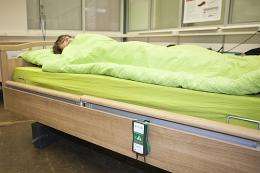To assess the mobility of bed-ridden patients

In June a monitoring system is becoming commercially available that will allow nursing staff to accurately record the mobility of bedridden persons. The system has been developed for the prevention of bedsores by Compliant Concept, a start-up at Empa’s glaTec technology center.
Healthy people move an average of two to four times per hour in their sleep. The movements are triggered by pain that occurs when tissue has an insufficient blood supply. The sleeping person changes position involuntarily, relieves the pressure point and therefore prevents bedsores, which are known in professional jargon as "decubitus ulcers". However, the decubitus prophylaxis that is "built in" by nature does not work in people with paralysis and patients who are sedated, unconscious or suffering from a high fever; often it also fails in elderly people. The lack of movement means that parts of the body remain under pressure for too long, and the micro-circulation is interrupted. If this persists for too long, it can result in a painful bedsore.
In order to prevent this, bedridden patients must be moved at regular intervals. Compliant Concept, a spin-off of Empa and ETH Zurich, has developed a "Mobility Monitor" that alerts nursing staff when it is time to reposition a patient. The system assesses and records the mobility of a bedridden person. The monitoring system is part of a bigger concept for decubitus prophylaxis that is developed with doctors and care experts. The goal of Michael Sauter and his team is to establish an entire hospital bed system that imitates the movements of a healthy person during sleep and therefore continuously and gently moves the patients.
The measuring unit of the new system is installed beneath the mattress and connected to the display unit at the edge of the bed as well as to the light signaling system. The monitor uses a traffic light system to show how mobile the patient is at any given time, and therefore provides valuable information that helps nursing staff to correctly estimate the risk of decubitus, and therefore reduces unnecessary physical effort. The nursing staff is often unsure whether the patients need to be moved at all. Particularly during the night, it would be better if the patients' sleep did not have to be disturbed unnecessarily. The system also reminds the personnel when the next movement is due and issues a warning if too much time has gone by since the last movement.
Successful in numerous tests
In the last few months the new system has proven itself to be extremely useful in numerous tests in care homes and hospitals. The "Mobility Monitor" will be available on the Swiss market as of June. It can be purchased directly from Compliant Concept.
Financing for further projects relating to the "intelligent" hospital bed, for which the fledgling company has already received several awards, has been secured until the end of the year. Until then Sauter wants to obtain additional capital for the company by means of another round of financing so that the product can be launched internationally over the next few years.


















